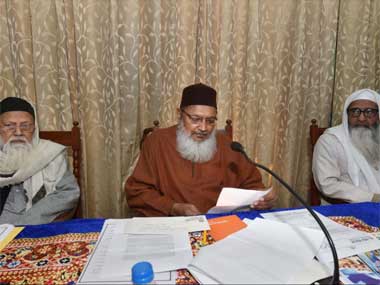The All India Muslim Personal Law Board (AIMPLB) has decided to file a petition seeking a review of the 9 November judgment of the Supreme Court on the Ayodhya dispute. The judgment among other things has issued a direction to the Central government that within a period of three months from the date its judgment to formulate a scheme and setting up of a trust which shall be responsible for the construction of a temple at the site. Also, it was instructed that a suitable plot of land measuring 5 acres should be given to the Sunni Central Waqf Board. [caption id=“attachment_7667971” align=“alignleft” width=“380”]  (File photo) Maulana Rabe Hasani Nadvi, president of All India Muslim Personal Law Board (AIMPLB), General Secretary Wali Rahmani and Khalid Saifullaha Rahmani. PTI[/caption] Now, a week after the judgment the AIMPLB has decided to file a petition seeking a review of the 9 November judgment of the Supreme Court. However, as reported by News18 Uttar Pradesh Sunni Central Waqf Board, which has been awarded the alternative five-acre land for a mosque by the apex court, as well as Iqbal Ansari, also a main litigant, distanced themselves from the Board’s decision and said they would not file a review petition. An important point to be noted is that the AIMPLB was not a party to the title suit case and it would require the approval and support of at least one of the eight Muslim litigants to file a review petition. What is a review petition? Article 137 of the Constitution of India provides for the review of a Supreme Court judgment. It states, “Review of judgments or orders by the Supreme Court Subject to the provisions of any law made by Parliament or any rules made under Article 145, the Supreme Court shall have power to review any judgment pronounced or order made by it.” Article 145, 1 (e) of the Indian Constitution states that “Subject to the provisions of any law made by Parliament the Supreme Court may from time to time, with the approval of the President, make rules for regulating generally the practice and procedure of the Court including : Any judgment pronounced or order made by the Court may be received and rules as to the conditions the procedure for such review including the time within which applications to the Court for such review are to be entered.” Under Supreme Court Rules, 1966 such a petition is to be filed within 30 days from the date of judgment or order and as far as practicable; it is to be circulated, without oral arguments, to the same Bench of Judges who delivered the judgment or order sought to be reviewed. Also, review petition is a discretionary right of court and the grounds for review are limited in scope. Impact AIMPLB review petition if admitted will have on 9 November judgment Till the court, while hearing a review petition grants any stay on its previous order or in its final order in the “review” decides to reverse its earlier judgment, the older judgment stands to have the same effect as it was on the day it was delivered. In the present case, all the directions and reliefs that have been announced by the apex court in its 9 November judgment needs to be implemented by the concerned authorities without any change. In the last week, two important review petitions have been heard by the Supreme Court. In the first case, which relates to the entry of women of certain age in Sabarimala temple, Supreme Court on 14 November referred the matter to seven-judge bench while observing that the case did not only concern the entry of women to the Sabarimala shrine but will have larger ramification on all aspects where religious rights are pitted against principles of gender parity. In another case, the three-member bench of the Supreme Court on 14 November, dismissed all petitions seeking review of the apex court’s 2018 order in the Rafale fighter jets deal case. In the 14 December 2018 order, the Supreme Court had said that there was no reason to doubt the decision-making process in the procurement of 36 Rafale fighter jets and gave a clean chit to the Narendra Modi-led government at the Centre.
AIMPLB was not a party to the title suit case and it would require the approval and support of at least one of the eight Muslim litigants to file a review petition.
Advertisement
End of Article


)

)
)
)
)
)
)
)
)



